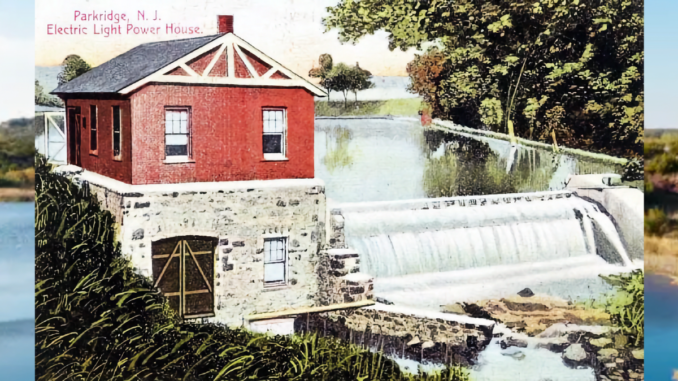
PARK RIDGE, N.J.—Efforts to upgrade Mill Pond were discussed at the May 27 Borough Council meeting, including testing pond sediment for contaminants and a resident-led effort to hold a November referendum to decide on whether to dredge the silt-plagued waterbody.
On May 27, the Borough Council authorized its engineer to proceed with sediment testing to determine the extent of contaminants in Mill Pond and then apply for state NJDEP permits to dredge the pond, which is clogged with sediment, said the mayor and borough engineer.
Most of the contaminants found in pond sediment include various petrochemicals, said Borough Engineer John Dunlea, of Neglia Engineering Group.
They said these efforts, which should be completed by July, are needed to get the Mill Pond dredging project shovel-ready for grant funding opportunities.
Also, Mayor Keith Misciagna noted the borough received a $1.5 million state grant to complete the preliminary testing and studies needed.
Mill Pond, also known as “Electric Lake” suffers from sediment buildup, declining storage capacity, and poor water quality. If sediment removed during dredging tests positive for toxic contaminants, future disposal costs may jump significantly, officials said.
Many years ago, the pond was the site of the borough’s first hydro-powered electric plant that provided electricity to residents. It was also a swimming hole, ice skating rink, and fishing spot for locals over many decades.
Now, officials said, the pond’s water quality had significantly deteriorated, and the borough engineer said the pond’s structural condition was downgraded to fair after a 2024 structural analysis. Previously, he said, the dam’s structural integrity was rated satisfactory but had been lowered. He said this means the dam is “not perfect” but it’s also not anywhere near collapse.
He said the structural integrity ratings range on a scale that includes satisfactory, fair, poor, and unsatisfactory.
At the May 27 meeting, Misciagna also urged resident Kari Shelby, who has begun a petition to dredge Mill Pond, to continue to gather residents’ signatures and apply pressure to the council to possibly hold another referendum on pond dredging in November.
Shelby, of Mill Road, said a petition she started a week ago had already garnered about 400 signatures and raised $600 to help improve Mill Pond, She urged the council to hold a November referendum to ask the voters to dredge and improve the pond.
Borough Clerk Maggie Giandomenico said it would be possible to get a townwide referendum on the November ballot if a decision was made at the August council meeting.
However, Misicagna said he preferred not to govern by referendum and also noted that there was much confusion among residents surrounding the last dredging referendum.
He urged Shelby to use any funds collected so far to help educate the public about the pond’s condition, what was needed to restore it, and possible costs for dredging and restoration.
The last non-binding referendum held in November 2023 was to bond up to $15.5 million to dredge and restore the pond’s water quality and storage capacity. It was defeated by voters. Both Shelby and Misciagna noted that there was some confusion about the 2023 referendum question and costs as it was posed on the ballot to local voters.
Previously, said Dunlea, it was determined that 65% of dredged pond sediment was likely to exceed NJDEP residential fill standards. However, new testing was required by NJDEP to determine contaminant levels now as the prior testing was over a decade ago, he said.
Councilor William Fenwick noted prior decisions on Mill Pond over the last century were put on referendum for voters to decide, and he would support another referendum. Misciagna noted that even should a bond referendum be approved by voters, councilors do not have to spend the total bonded amount but could spend less on improvements.
Misciagna said he would like to have Mill Pond dredged while he is still in office, noting the best time to get something done on the pond is now. He said residents did not understand the last referendum, but when he talked to them about specifics, most supported the referendum.
Another resident, Albie Sternberg said he wanted to “urge the council to prioritize the long overdue dredging of Mill Pond” which now acts as part of the town’s stormwater drainage system.
He said “instead of buffering the town from floods, it contributes to them,” due to accumulated sediment. He questioned when dredging the pond would be more urgent, affordable or cheaper.
“The longer we delay, the more expensive and complicated it becomes, Dredging now to me seems to be proactive, dredging later is reactive,” he said, noting future flooding and public health concerns from not dredging,” he said.
Christa Madler, Willow Court, said the pond has become “an absolute eyesore” and questioned how the pond’s condition would affect nearby property values. She said when she moved to town in 2016, the pond was one area that attracted them to town.
She said “tough decisions have to be made” on Mill Pond, and wondered when the council would make the unpopular “hard decisions” needed on Mill Pond. She asked why Park RIdge was responsible for so much funding to dredge the pond.
Misciagna said they have contacted congressional members and senators to search for grant funding on a regional basis. He said they’ve sought funds based on the pond’s historical and bistate value, and suggested it would be valuable if residents also contributed. “We are trying every area we can to find somebody to give us help,” said the mayor.
He suggested a town-wide education campaign to educate voters about the pond referendum, noting residents were generous with tax dollars, “if they understand exactly where it’s going.” He said residents were “heartbroken” over the pond’s current condition.
Council President Greg Hoffman said the borough was reconstituting a green team to take on environmental issues. He urged residents to reach out to state and federal officials to seek additional funds for dredging the pond.
